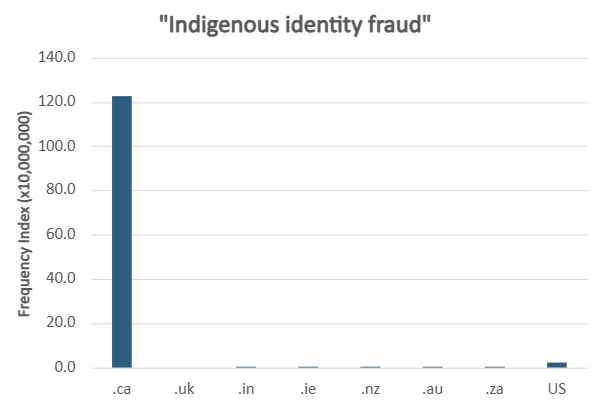Quick links
Indigenous identity fraud
DCHP-3 (Apr 2025)
expression — Indigenous, Ethnicities
a non-Indigenous person falsely claiming Indigenous identity, usually for professional gain.
Type: 5. Frequency — Although the term Indigenous identity fraud was used early by American and Australian media (see the 2017 quotations), these instances have since been dwarfed by subsequent Canadian usage (see Chart 1 and the 2020, 2022 and 2023 quotations). Institutional Canada seems to be adopting it as the preferred alternative to the more informal pretendian.
The adoption of both Indigenous identity fraud and pretendian in the Canadian lexicon in the 2020s can perhaps best be understood in the contexts of, on the one hand, the 2015 findings of the Truth and Reconciliation Commission, which has led to increasingly widespread awareness of injustices suffered by Indigenous peoples, and, on the other hand, a resurgence of Indigenous activism that has followed in the wake of the birth of the 2012 Idle No More movement. The expression is used most frequently in Canada (see Chart 1).
The adoption of both Indigenous identity fraud and pretendian in the Canadian lexicon in the 2020s can perhaps best be understood in the contexts of, on the one hand, the 2015 findings of the Truth and Reconciliation Commission, which has led to increasingly widespread awareness of injustices suffered by Indigenous peoples, and, on the other hand, a resurgence of Indigenous activism that has followed in the wake of the birth of the 2012 Idle No More movement. The expression is used most frequently in Canada (see Chart 1).
Quotations
2017
["Indigenous identity fraud and cultural appropriation are extremely serious issues with which our discipline grapples," Cobb-Greetham said. "As scholars in our field, we know that Indigenous identities have complex political, cultural and racial components, and there is a difference between and among being 'enrolled' in a federal, state or unrecognized tribal polity, being 'unenrolled' but of tribal heritage or descent, and in making something up out of whole cloth."]
2017
[The Australian reports that the Yothu Yindi Foundation suggests there are degrees of Aboriginality and is concerned about indigenous identity fraud ("Self-identifying indigenous 'deprive' NT brethren", 29/11). I recommend they seek advice from Andrew Bolt before making further public statements.]
2020
Indigenous identity fraud occurs when non-Indigenous people pose and represent themselves as Indigenous. This phenomenon is not new news to us. We have been dealing with it for a few centuries. From Archie Belaney (Grey Owl), to Dr. Andrea Smith, Associate Professor of Media and Cultural Studies at UC Riverside1 , writer Joseph Boyden, filmmaker Michelle Latimer, and even more recent newsworthy instances, there have always been a few non-Indigenous people “playing Indian” in our midst. Each of these, and many others, were well published, highly regarded... professionals, who built esteemed careers on stolen identities and were rewarded with “personal, professional, positional, and financial gain.” 2 Indigenous identity fraud is also known as “race-shifting” and pretendianism. It is fraud and academic misconduct.
2022
Indigenous identity fraudsters make a mockery of truth and ethical standards.
We should care deeply about Indigenous identity fraud and every measure should be taken to put a stop to it.
2022
Alexis said there's always a reason for Indigenous identity fraud.
"At the university level, we have people who are not Indigenous who claim that they are Indigenous to gain benefits, to gain bursaries and so on," said the chief.
2023
Universities need new policies and procedures to deal with Indigenous identity fraud, said TallBear, who is a University of Alberta professor and Canada Research Chair in Indigenous Peoples, technoscience and society.
"I really want to see universities have the courage to start the conversations, and figure out how to change their rules, policies and procedures instead of just burying their head in the sand."
Images
